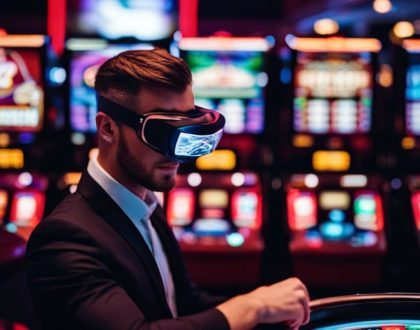Riot Games in trouble over Gambling-Linked In-Game Skin

Fans of the immensely popular League of Legends (LoL) video game are far from pleased with Riot Games, its developer. The reason? A freshly released in-game skin that seems to be intertwined with an established gambling system. It appears that Riot missed the memo on the changing landscape regarding loot boxes and other randomized in-game mechanics.
At the end of this month, LoL is set to introduce a batch of new “Cosmic Capsules,” rewards tied to specific in-game milestones. Unless Riot makes changes to their mechanics before then, players are threatening a massive global boycott.
A Closer Look at the Capsules
These capsules offer players the opportunity to snag a particular skin, the “Dark Cosmic Erasure Jhin,” a character within the game. But here’s the catch – the only way to obtain it is by purchasing a randomized capsule, without any clue of its contents.
The passionate debates among LoL players about these capsules are not without reason. The ongoing discussion stems from the fact that these capsules can either yield valuable items or result in a disappointing purchase.
However, things took a turn for the worse when the Public Beta Environment (PBE) data mine exposed unsettling information about the upcoming game capsules. These capsules, slated to be part of the “Cosmic 2023” event, might adopt a “Gacha”-like approach, further fueling uncertainty and speculation among the player base.
A “Gacha” Mechanic Unveiled
Much like loot boxes, “Gacha” games prompt players to spend in-game currency in exchange for random in-game items. Emily Lawrenson from Qustodio, a company promoting responsible online interaction, describes them as video games that coax players into spending in-game currency on virtual items as they progress.
The items acquired through these mechanisms are often randomized, sparking a debate on whether in-game loot boxes and similar incentives can be likened to gambling, as players pay for a chance without any guarantee of the outcome.
As soon as the PBE data was unearthed, LoL players voiced their concerns. Initially willing to invest in event passes and capsules as needed, they became apprehensive upon seeing the disappointing outcomes.
The negative reception has been so strong that some have labeled this year as one of the worst for LoL. Players are even hinting at potential calls for changes at the highest governmental levels worldwide.
Microtransactions Under Scrutiny
The road ahead for Riot remains uncertain. With no response to media requests and seemingly oblivious to regulatory developments in Europe and the U.S., where loot box regulations are looming, Riot’s position is under scrutiny.
In the UK, the gaming industry has taken a comprehensive 11-step strategy to address loot boxes. This strategy involves technological measures to prevent children’s access, awareness campaigns, and transparency about these virtual containers.
After an extensive three-year investigation, the UK government leaned toward industry self-regulation. This decision stems from the urgent need to address the issue adequately, given that microtransactions contribute around $15 billion in revenue.
Countries like Belgium, the Netherlands, and Austria have adopted more stringent stances. Diverging from the UK’s approach, they’ve taken firmer actions.
Belgium and the Netherlands have outright banned loot boxes and similar incentives to counter gambling addiction. Their resolve is to shield individuals, particularly minors, from the adverse effects of in-game purchases.
While Austria hasn’t implemented a complete prohibition, it has introduced rigorous regulations governing the use of virtual currencies in secure storage areas. This also aims to prevent excessive spending by minors.
While approaches vary, there’s a common thread – most countries around the world are tightening the reins on the video game industry.
In Conclusion
The ongoing conflict between Riot Games and passionate LoL players regarding the integration of gambling-like mechanics through Cosmic Capsules highlights a broader shift in the gaming landscape. The calls for transparency, fairness, and player protection are growing louder. The question remains: how will developers respond to these demands, and will the industry adapt to meet the evolving expectations of their audience?
Frequently Asked Questions
What are Cosmic Capsules in LoL?
Cosmic Capsules are in-game rewards in League of Legends, earned by achieving specific milestones. These capsules contain various virtual items, including character skins.
What is the Dark Cosmic Erasure Jhin skin?
The Dark Cosmic Erasure Jhin skin is a character skin in League of Legends. Players can acquire it by purchasing a randomized capsule, sparking controversies due to its gambling-like nature.
What is a “Gacha” game?
A “Gacha” game is a video game that employs a mechanism similar to a toy vending machine. Players spend in-game currency to obtain random virtual items. The randomness has prompted debates on whether it constitutes gambling.
How have countries responded to concerns about loot boxes?
Different countries have adopted varying approaches. Belgium and the Netherlands have completely banned loot boxes due to gambling concerns, while others like the UK and Austria have introduced regulations to protect players, especially minors.
What impact does this controversy have on the industry?
This controversy reflects a global trend where players and regulators scrutinize the use of gambling-like mechanics in the gaming industry. Discussions about fairness, transparency, and player protection have been ignited.
Recommended Posts

Legal Nuances of Operating an Online Casino
May 17, 2024

The World of Wearable iGaming Tech
May 17, 2024

Going Live – Surge of Live Stream Gambling
May 17, 2024



